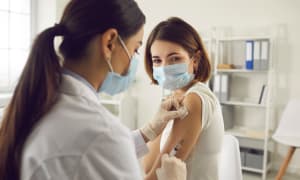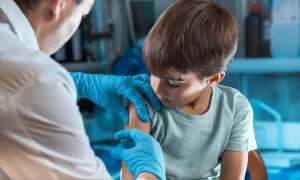THE head of Sunraysia's largest Aboriginal health organisation says "myths" are to blame for Indigenous people in north-west Victoria having the lowest COVID-19 vaccine take-up in the state.
According to vaccination figures released by the Federal Health Department last month, the north-west had the lowest rate of full vaccination in Aboriginal and Torres Strait Islander people aged over 15 in the whole state, at just 19.09 per cent.
That figure compares to the 36.4 per cent of the general population who are fully vaccinated in the north-west – a gap of 17.31 percentage points.
First-dose vaccination rates for Indigenous people in the region are also lagging behind, at 34.55 per cent, compared to 59.1 per cent of the population as a whole.
It was a similar story across the river, where 18.94 per cent of Indigenous people were fully vaccinated and 36.61 per cent had at least one dose, in contrast to the 33.7 per cent of the general population who were fully vaccinated and 61.2 per cent who had had at least their first jab.
Mallee District Aboriginal Services chief executive Jacki Turfrey told Sunraysia Daily she suspected the gap was caused by vaccine conspiracy theories spreading like wildfire among Sunraysia's Aboriginal community.
"There's a lot of myths being circulated about there being metal and metal traces in the vaccines, about there being implants being putting being put into people who get the vaccine, about fertility … they're actually making our job much, much harder," she said.
"The myths are out there – they're ramping up. As a result, you've got a lot of people are nervous and afraid to get the vaccine. There's no counter media that actually goes through and dispels the myths. That would have an amazing impact."
Ms Turfrey rejected the suggestion vaccination providers weren't doing enough to get Aboriginal community members to roll up their sleeves, laying the blame at the feet of the Federal Government.
"There's a lot of nervousness about the safety of the vaccine," she said.
"I think that was caused very early on – we had excellent uptake of AstraZeneca, but as soon as the government started changing its position and shifting around on who it was safe for … it's just made our job that much harder."
Rather, Ms Turfrey said, MDAS was hitting well above par in its efforts to get First Nations people – and the general Sunraysia community – vaccinated, with a wait list that now stretches into next month.
"In the last two weeks, we've opened up our vaccine clinic to five days a week and at the moment we're vaccinating over 1000 people a week – and that's just in Mildura," she said on Friday.
"We're reaching out individually now to people, to see if we can encourage them to come in, and that process has actually been quite successful.
"This week alone, we managed to get 106 Aboriginal and Torres Strait Islander people vaccinated. If you look at the Aboriginal population numbers compared to the general population as a percentage, that's 10 per cent (of vaccinations) but our population isn't that high. I'm seeing that as a positive."
In a bid to get more Aboriginal people through the door, MDAS is offering incentives to Indigenous people who get their jabs.
"What we've been offering Aboriginal clients to come in is a either a Coles voucher or a Kmart voucher on each vaccine … and then, upon full immunisation, we're giving our community a COVID-19 'I'm covered' vaccination T-shirt," Ms Turfrey said.
"I actually met one of our mob (on Thursday) and she said, 'I'm just heading off to get my vaccine – I want my T-shirt,' so it obviously does make a difference."
But Ms Turfrey suggested more assistance encouraging people to book in would lead to a lift in Aboriginal people getting their vaccines.
"Honestly, I think if the government were able to allow us to increase our incentives that are available, we'd get more of our mob through the door," she said.
The COVID-19 outbreak in NSW's far west continues to grow, hitting a total of 111 cases – many of whom are in the remote Aboriginal community of Wilcannia – reported by late Sunday .
Many Aboriginal people in Sunraysia have felt first-hand the impact of the virus on their community.
According to Ms Turfrey, the plight of their friends and family in Wilcannia should be a wake-up call to Aboriginal people in Sunraysia that rolling up their sleeves for the vaccine was the right thing to do.
"My message to all Aboriginal people is you need to get vaccinated," she said.
"If you're hesitant, come in and book an appointment with one of our doctors in the clinic, sit down and talk through your concerns. We've had a few people do that so far, and those people have gone on to get vaccinated.
"The only way to protect yourself, your family, your elders, your mob, your community from this virus is to get vaccinated."






